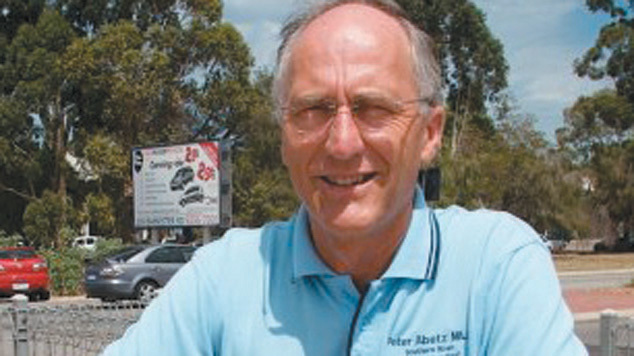
Peter Abetz last week made comments regarding the Safe Schools Coalition Australia program, stating that the anti-bullying initiative “a gay, lesbian, transgender lifestyle promotion program.”
“The militant gay lesbian lobby is trying to get this into our schools to ‘normalise’ what they consider the LGBTI agenda.” he said during a presentation to Liberal MPs at Parliament House.
Mr Abetz’s briefing to fellow MPs was revealed by The West Australian‘s political reporter Gareth Parker last week.
The program’s national director Sally Richardson said in a statement that the program, which is scheduled to be introduced in WA later this year, has received a positive reaction in other states.
“Safe Schools Coalition Australia will be implemented in WA by the middle of 2015. Since the program’s official launch last June we have had a lot of interest and support from WA schools, young people and community organisations. We are looking forward to supporting WA schools to be safer and more supportive for LGBTI young people, teachers and families. All students have the right to feel safe at school – only then can they achieve their very best. Everyone wants that.”
Other noted LGBT advocates have been voicing their support for the program. Perth organisation GLBTI Rights In Ageing Inc. made a statement disputing Abetz’ assertion that “most young people with same-sex attraction or transgender feelings lost them as they matured”, as well as his follow up comments made to 6PR fearing that the program’s recommendation to remove books promoting heteronormative assumptions would “make transgender, homosexual, lesbian, to make that the new norm and heterosexual the abnorm”.
“Mr Abetz expresses his concern that the gay and lesbian ‘agenda’ is to ‘normalise’ diverse sexuality and gender identity. This is entirely unproblematic for a great majority of Australians who understand that diversity is normal. Normalising LGBTI people does not make heterosexuality ‘the abnorm’ as Mr Abetz fears – rather to be inclusive means to widen the norms, rejecting a belief in a ‘normal’ that remains the exclusive domain of heterosexuals. Clearly Mr Abetz needs to take an Inclusivity 101 class to understand these basics,” Ms Lowe said.
“Mr Abetz is also misinformed in his belief that ‘most young people with same-sex attraction or transgender feelings lost them as they matured’. A great body of international research does not support this view. Historically, when oppressive social stigmas and severe legal sanctions were in place, many people denied their identities and ‘feelings’, often at huge personal cost and causing high incidences of mental illness. It has been shown that rates of depression and suicidality drop dramatically when people are able to express their true sexuality and/or gender identity.
“It is true that sexuality and gender identity can be fluid over a lifetime. However, the direction is generally opposite to that proposed by Mr Abetz. With the reduction of social stigmas and anti-discrimination legislation, we are seeing increasing numbers of older people, ‘coming out’ even in their 70s and 80s.
“It would be far preferable if politicians would base their opinions on the facts rather than old myths and their personal prejudices, which can be very damaging,” Ms Lowe concluded.
However, not all comments regarding the issue have been supportive of the program. A letter against the initiative was circulated to a number of state school principles in Tasmania, where the program will also be introduced this year. Religious leaders including the Anglican Bishop of Tasmania, the Right Reverend John Harrower, and the Catholic Archbishop of Hobart, Julian Porteous signed the letter, which read in part:
“While we deplore all forms of bullying and welcome the intent of anti-bullying programs, the content of the SSCA program focuses only on the bullying of same-sex attracted, “intersex” and “gender diverse” students – not addressing the range of other more common forms of bullying. This is contrary to the approach recommended by Australia’s peak anti-bullying body – the National Centre Against Bullying. NCAB suggest that bullying in schools is best dealt with using, “a universal, whole-school approach, taking a multi-faceted approach, rather than focusing on one single component.”
“We have a number of other serious concerns about the controversial content of this programme (which we believe many parents would share). These are detailed in the attached open letter to the Prime Minister (currently being used by concerned parents to raise awareness about this radical programme).”
Tasmanian Gay and Lesbian Rights Group spokesperson Rodney Croome was one of a number of LGBT activists in Tasmania who signed their own letter in response, giving support for the program and the aim of providing Australian students with more inclusive schools. Croome stated those who see the program as giving LGBTI students “special status” are misinformed about the program.
“It’s unfortunate that misinformation is being spread about the Safe Schools Coalition.”
“The program, as it will be implemented in Tasmania, has no sexual content, does not favour one group of students over another, and is no different to programs that have been implemented in Tasmania for 20 years, except that it is better funded.”
“Safe Schools is about training teachers so they have the skills and information they need to effectively challenge class room prejudice and bullying.”
“The focus of the Program is prejudice based on sexuality and gender, which accounts for 50% of school bullying according to the Department of Education’s own guidelines.”
“When teachers and parents get accurate information about the Safe Schools Coalition I think their response will be ‘about time’.” he said.




